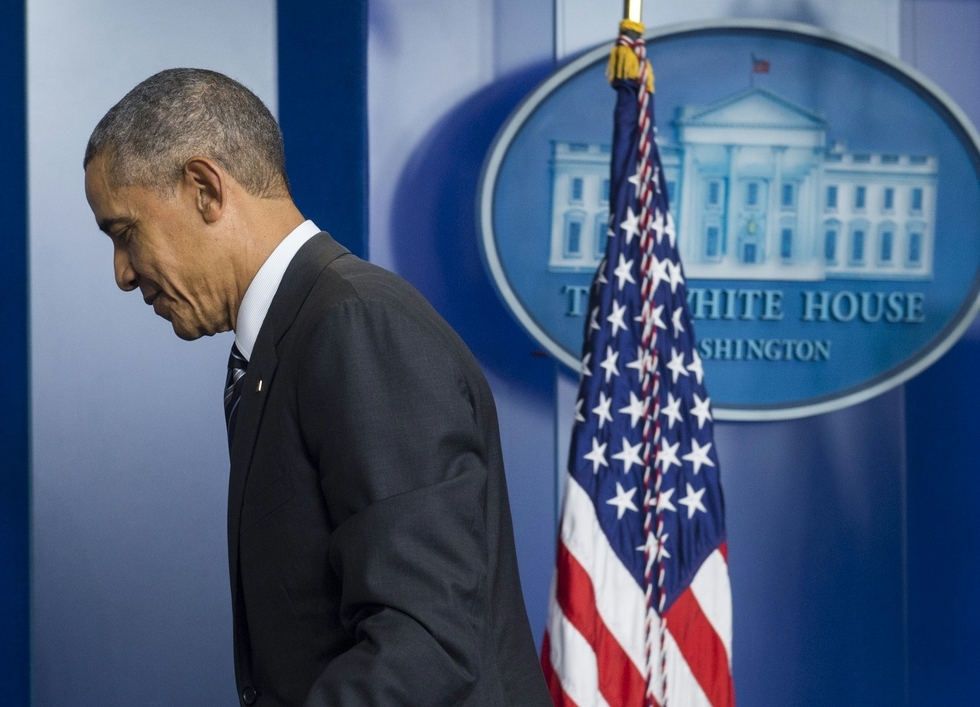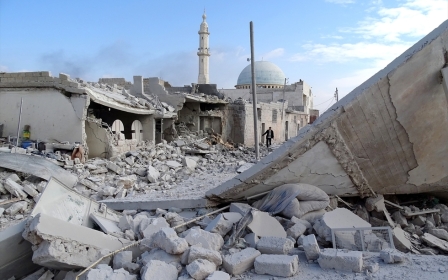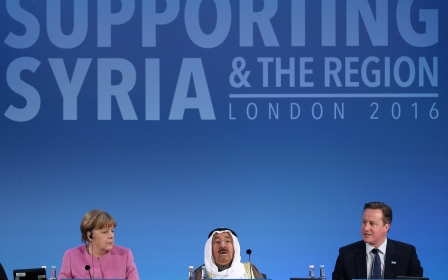US stance on Syria reflects regional retreat

There is no doubt that the meeting which took place in Riyadh on 23 January between US Secretary of State John Kerry and Riyad Hijab, general coordinator of the High Negotiations Committee, was extremely important because it signified the reality of where the Obama Administration stands on the Syrian crisis.
The High Negotiations Committee (HNC), which was born out of the conference of the Syrian opposition forces that was held in Riyadh in December, represents the largest possible segment of political and military opposition forces. Since the US, and for that matter most of the countries that support the Syrian people’s revolution, urged the Syrian opposition to unite its ranks, the High Negotiations Committee marks a significant development in the course of the Syrian revolution.
Indeed, Washington had earlier welcomed the Riyadh conference and the birth of the HNC. Furthermore, the committee does not only represent the largest segment of the opposition forces, but also the will of these forces and their agreement to join the course of negotiated political settlement for the Syrian crisis.
In addition to all of this, the Kerry-Hijab meeting took place only days before the launch of the negotiation process between the opposition and the Syrian regime in Geneva under the supervision of the United Nations.
The meeting was supposed to bear reassurances for the Syrian opposition, particularly since the period that preceded the negotiations saw plenty of statements and counter statements by parties concerned with the process. It was also enveloped in a tangible level of ambiguity, whether with regard to the position of the UN envoy to Syria, Staffan de Mistura, or with regard to the positions of Russia and the US, the two principal sponsors of the gathering.
However, the meeting – according to Syrian opposition sources – was perhaps the worst ever in the history of the relationship between the Syrian opposition and American officials.
During the meeting, discussing disagreement over the negotiation process and its objectives, Kerry said that Washington did not object to the Iranian proposal regarding the negotiations; that the UN envoy de Mistura had the right to invite whomever he wished from among the Syrians to be his advisers; that there was no timetable set for discussing the departure of Bashar Al-Assad; that the objective of the process was to reach a fully authorised national unity government and not just a provisional governing body; that it was necessary to begin the negotiations even before the Syrian bombardment was halted; and that the failure of the opposition to go to Geneva would result in stopping American aid to the opposition.
Kerry’s conversation reflected a significant turnaround in the American position toward the negotiations process and its objectives, not just away from what the Syrian opposition was hoping for but also away from what the Americans signed up to during the first Geneva declaration made in June 2012.
Kerry’s remarks and his warning to the Syrian opposition provoked angry reactions within the ranks of the Syrian opposition forces. This might even lead to intervention on the part of countries that support the Syrian revolution and that are friends of the US, such as Turkey, Saudi Arabia and Qatar.
This is what prompted Michael Ratney, US Special Envoy to Syria, to issue a statement of clarification on 26 January in which he claimed that there had been some misunderstanding during the meeting between Kerry and Hijab caused by bad translation. Ratney reaffirmed that a fully authorised provisional governing body is, from Washington’s viewpoint, the only way forward to resolve the crisis and that Washington does not approve of other parties' visions (most likely implying Iran and Russia) of a national unity government.
The truth, of course, is that Kerry had said exactly what Hijab and his colleagues understood him to have said. What the US secretary of state expressed was not the first indication of the American change of heart vis-à-vis the Syrian crisis. This was preceded by other U-turns with regard to the first and second Vienna accords of October and November 2015.
There is an impression that de Mistura is seeking personal glory and that his principal concern is to begin the process and reach some kind of a solution irrespective of the demands, rights and plight of the Syrian people. But the real issue, in fact, is not de Mistura but the American position.
The Geneva negotiations project could not have been implemented and the UN Security Council resolution could not have been issued had it not been for the American-Russian concord in Vienna. At the time Russia did not hide - whether via its direct intervention in Syria or via its political manoeuvres - its endeavour one way or another to support and maintain the regime of Bashar al-Assad; the United States was expected to defend the demands of the Syrian people and opposition groups and to work seriously in order to see that the process of free democratic transition in Syria was accomplished.
However, developments in the Syrian crisis do not indicate that this is exactly what the Obama administration is pushing for. The claim that an American-Russian conspiracy is being hatched in order to bury the Syrian revolution alive is not true. But it is obvious in Syria as well as over other issues in the Middle East, that the Obama administration is no longer what it was in 2011.
Obama's retreat from intervention
Perhaps the two speeches given by Obama in Cairo and Istanbul a few month after he took over in the White House in 2009 were the best indicators as to what his administration wanted to accomplish via its policy toward the Arab region and the Muslim world.
The two speeches bore an unhidden reconciliatory message after eight years of a policy of war adopted by the administration of George Bush Jnr. Although both speeches implicitly acknowledged that dictatorial regimes augment crises in the Middle East, Obama did not explicitly call for a comprehensive democratic transition in the region.
In fact, his rhetoric seemed to indicate a stepping back from the routinely interventionist American approach. In 2011, the Obama administration was surprised, as many others were, by the eruption of the Arab revolutionary movement. It was even more surprised to see that movement spread so rapidly from Tunisia to Egypt and then from there to a number of other Arab countries.
The role of the Obama administration, and particularly the role played by Secretary of State Hillary Clinton in the rapid development of the US approach toward the Arab revolutions, and in calling for supporting the demands for freedom, democracy and good governance is to be commended. However, since at least 2013, the beginning of Obama’s second term, ambivalence began to envelop US policy and conceal the truth about the US stance toward the process of change and democratic transition in the region.
Since 2013, the Obama administration has faced an increasingly complex situation in the Middle East represented in a severe division among its own allies in Turkey and the Gulf regarding the process of democratic transition.
There was also the coup in Egypt, the development of the Syrian revolution into a fully fledged civil war, the collapse of the transitional processes in Libya and Yemen and the considerable growth in the power of the Islamic State and consequently its control of large sways of Iraq and Syria.
The Obama administration did not have the readiness to bear the rising cost of adopting a positive policy in the Middle East. Instead of leaning heavily in favour of the forces of democratic transition, it chose as its priority accomplishing the nuclear agreement with Iran and fighting terrorism at a relatively low cost.
There is no hope that a positive change will occur in American policy, neither toward Syria nor toward any of the other Arab revolution countries. The only hope left is for the region’s states, those that are allied with the United States in fighting terrorism, to bear the burden of the war on terrorism without obtaining anything from Washington in exchange.
- Basheer Nafi is a senior research fellow at Al Jazeera Centre for Studies.
The views expressed in this article belong to the author and do not necessarily reflect the editorial policy of Middle East Eye.
Photo: US President Barack Obama leaves after speaking about the economy in the Brady Press Briefing Room at the White House in Washington, DC, 5 February, 2016 (AFP).
New MEE newsletter: Jerusalem Dispatch
Sign up to get the latest insights and analysis on Israel-Palestine, alongside Turkey Unpacked and other MEE newsletters
Middle East Eye delivers independent and unrivalled coverage and analysis of the Middle East, North Africa and beyond. To learn more about republishing this content and the associated fees, please fill out this form. More about MEE can be found here.





